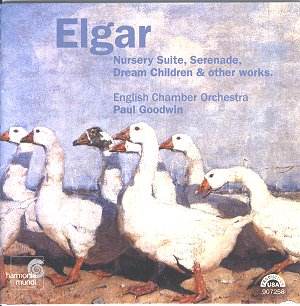ELGAR
Nursery suite, Dream Children, In Moonlight, Romance for Bassoon, Sospiri,
Serenade for strings, Elegy
 Julie Price (bassoon) Stephanie
Gonley (violin) William Bennett (flute) Osian Ellis harp)
Julie Price (bassoon) Stephanie
Gonley (violin) William Bennett (flute) Osian Ellis harp)
Paul Goodwin (conductor) English Chamber Orchestra
Recorded 2000
 Harmonia mundi HMU 907258
(59'
31")
Harmonia mundi HMU 907258
(59'
31")
Crotchet Ahead
of release. Try this sales link at intervals until it works.

Attractively packaged, though it proved a life and death struggle to shoehorn
the disc out of its saddle (a problem incurred rather too frequently these
days, and in one recent incident split a review cd from side to side), this
selection of works written between 1892 and 1930 is described as 'a lyrical
programme of Elgar rarities' but to call either the Nursery Suite
or the String Serenade 'rarities' is both over-egging the pudding
and stretching the definition of the word beyond credibility. Nevertheless
it is good to see the fine ECO back on this disc, which was recorded at Henry
Wood Hall, London. It is an orchestra too often driven to foreign parts to
get work (Japan seems to realise their worth more than we do) but it has
survived more than half a century, thanks largely to the tireless efforts
of that self-confessed maverick, the co-principal violist Quintin Ballardie.
It's also good to see the juxtaposition of young soloists such as Julie Price
and Stephanie Gonley (the orchestra's leader) with familiar 'old timers'
such as Osian Ellis and William Bennett, all of them members of the orchestra,
though obviously only Price is the 'genuine' soloist here, the others having
'merely' prominent moments in the music.
Goodwin's approach is freshly unsentimental, his orchestral solos allowed
unreined freedom especially in the Serious Doll where we reap the
benefits of Bennett's beautifully judged phrasing. The ECO's tightly-knit
ensemble produces commendable pizzicato clarity in the lower strings in
Busy-ness, while the Sad Doll and Dreaming add a bloom
to the upper strings all too often missing in other orchestras' sound. The
lightly loaded-sounding Wagon passes at a fairly brisk pace which
suggests its brakes might have failed but the Merry Doll, with its
'Houswife's Choice' mood, produces more sparkling playing from the players.
Gonley's cadenza is thoughtfully paced, at turns reflective, elsewhere virtuosic,
always stylish.
The two-movement Dream Children (1902) follows on as they might have
done in the proposed coupling with the Nursery Suite by the Gramophone
Company in the early 1930s. This is a pair of mood pictures, the first of
which evokes the mist (of time) into which the pair of children receded in
Lamb's essay (the inspiration for the work), and the playing is appropriately
dreamy. In Moonlight is another version of the viola solo, the canto
popolare (but Elgar's own invention) from In the South, far less subtle
and without the translucent scoring of its original Alassio setting,
but stylishly done here with tastefully judged portamento connecting the
strings' linear phrases, which also becomes a strong feature of the heartfelt
playing of the mournful Sospiri for strings, harp and harmonium.
Julie Price's bassoon playing in the all-too short Romance is revelatory;
she has a creamily mellow sound from top to bottom (where too often tone
hardens into grotesquely comical parody) and is gifted with an admirably
agile facility. The familiar Serenade for Strings rather overdoes
the portamento, but then Elgar would have been used to much more than even
Goodwin demands. While the slow movement achieves a burning intensity by
strongly focusing on the inner textures and fast vibrato of violas and cellos,
it is somehow rather too calculated and doesn't quite match the natural
outpouring of a Barbirolli. For all that, the phrasing is stylish and every
nuance shaped and moulded to the very last chord of E major. The concluding
Elegy is suitably 'quiet, sad and soothing' to quote the composer
himself.
Coming in at just about an hour, it might have had another 15 minutes with,
for example, the Introduction and Allegro for Strings, but despite
this reservation and the fact that they may all be mainly familiar works
available on other discs, this one is worth hearing for the sheer musicality
of the playing by all the members of the worthy English Chamber Orchestra.
Christopher Fifield
Performance

Sound


